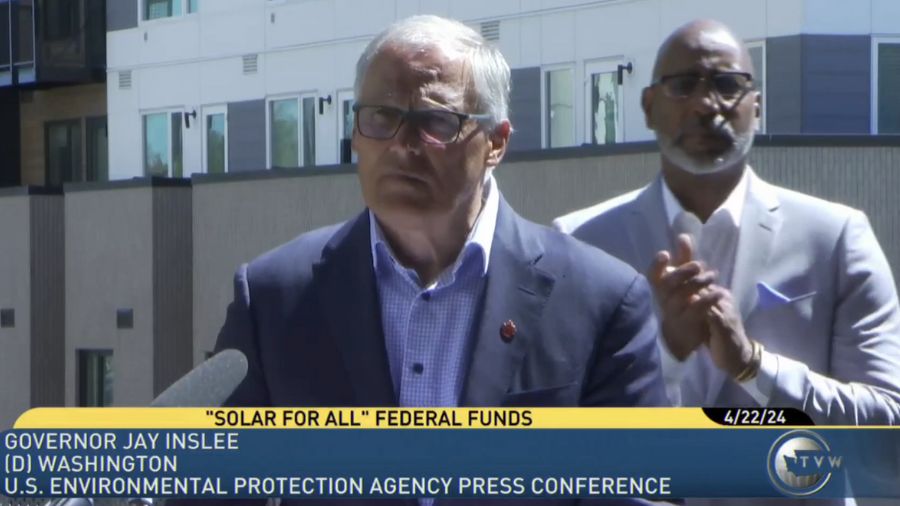Council member’s snarky email disappears, violates public records law
Aug 6, 2018, 5:42 AM | Updated: 10:56 am

Seattle Councilmember Sally Bagshaw. (Seattle Channel)
(Seattle Channel)
Seattle City council members must keep records of their work on city business, including correspondence with constituents. But a permissive city policy is leading to a potentially unknown number of public documents being destroyed without ever being recorded, in violation of Washington state law. Indeed, a recent snarky email to a constituent has mysteriously disappeared from a council member’s mailbox.
Say what you will about her policy positions, no one disputes Seattle Councilmember Sally Bagshaw is deeply committed to her district, which covers Pioneer Square to Magnolia. And the job requires her to work throughout the day and night. As a result, Bagshaw sometimes uses her personal email account to correspond with constituents.
“…We have literally hundreds if not 1000 [sic] emails coming into our office every week and sorting them and prioritizing them is a major part of our office work,” Bagshaw tells the Jason Rantz Show on KTTH in an email. “Responding to each is literally impossible during the business day, and I do my best to get back to those who have questions or offer solutions to the problems we are all facing.”
But sometimes, mistakes are made, and emails aren’t turned over.
Missing email with Sally Bagshaw
While working on another story, I discovered that a constituent, who I personally know, sent Bagshaw an email because he was upset that she skipped a meeting concerning the controversial South Lake Union tiny home village. At this meeting, city officials announced they were moving forward, a move they long-since determined, though the decision was kept from the public.
The email to Bagshaw was sent on the evening of June 28 and it was angry, claiming Baghaw and the mayor “…are too weak to stand up to the people of South Lake Union.” The emailer wrote to Bagshaw:
These weak leaders here were told by the Mayor that the new homeless camp “was not a done deal” when everybody here knew otherwise. You’re nothing but weak bullies … just like our leaders in DC. You’re no better.
Bagshaw’s response, according to a forwarded copy and screenshot of the email, was sent from her personal Gmail account, as it’s where the constituent letter was sent. She called the constituent email “mean and wrong” and explained she wasn’t at the meeting due to other commitments. She ended the email by writing, “Shame on you for this garbage.”
Bagshaw does not recall the email correspondence and she was not required to attend the meeting. But some in the audience had wondered why she – nor the mayor – showed up, given the project’s controversy.
After a public disclosure request for the emails, a public disclosure officer explained that they couldn’t find the emails. After some back and forth to help identify the email, another search was conducted but came up empty. It’s unclear what happened to the email from Bagshaw, and the two emails from the constituent.
Seattle council allows personal emails to be used
The use of personal email accounts to conduct city business is permitted and Bagshaw is hardly alone in using her personal account. Other council members do it, too.
“Doing City work on a non-City device doesn’t violate any of the Codes our office administers,” according to Wayne Barnett, Executive Director of the Seattle Ethics and Elections Commission.
But these emails are subject to public disclosure requests and are supposed to be maintained.
Generally, based on my previous public disclosure requests, the process for council documents works like this: you submit a request for documents, which is sent to a public disclosure officer. That staffer will reach out to the office of the council member who holds the documents that are sought. Forms are filled out, documents are submitted to the officer, then sent along to the requester — be it a media member or constituent. The turnaround time could be days or several weeks, depending on the request itself. And city staff, in my experience, have always been forthcoming with the requests, even if they know the documents may lead to stories they’ll be unhappy with.
This process is important when reporters (or talk show hosts) try to better understand how policies are decided, strategies formed, or constituents react. That’s why, when documents are missing, there are significant implications.
The missing Bagshaw email in question is, arguably, not very important. Bagshaw, however, seems to acknowledge it should have been saved. But if emails — or any documents — are missing that are, in fact, important, how does one track them down and report on them? And while the staff has been accommodating of requests, it seems that emails conducted on private email accounts won’t be on the radar for the staffers and will be hard to track down. How many more emails are missing?
“I try very hard NOT to use my personal account for the reasons you have identified,” Bagshaw emailed to me. “Everything I write about city business is subject to public disclosure and I know this. If something comes in or out to my personal Gmail related to city business, I do my best to forward a copy to my office so my staff can properly categorize it. I will redouble my efforts to do this so all city business is available to you and others in accordance with state law and locating it is as routine as we can make it.”
Yup: It’s the law
State law is very clear when it comes to maintaining records. The Public Records Act’s mission is rather matter-of-fact:
The people of this state do not yield their sovereignty to the agencies that serve them. The people, in delegating authority, do not give their public servants the right to decide what is good for the people to know and what is not good for them to know. The people insist on remaining informed so that they may maintain control over the instruments that they have created. This chapter shall be liberally construed to promote this public policy and to assure that the public interest will be fully protected. In the event of a conflict between [the PRA] and any other act, the provisions of [the PRA] shall govern. RCW 42.56.030.
Anyone can file a legal action to compel the release of public documents — with “public documents” defined rather broadly.
The council doesn’t always operate in public
The council and mayor’s office has recently been criticized — and faces a lawsuit — for their secrecy.
James Eagan announced a lawsuit against the city for violating the Open Public Meetings Act when the council and Mayor Jenny Durkan met to discuss repealing the month-old “head tax” legislation. The lawsuit claimed they agreed to appeal the tax “without any public debate” though the allegation is they reached a consensus “via unlawful clandestine discussions” according to the suit, per the Seattle Times.
Eagan rejected a settlement offer from the city.
“It is troubling when corruption in the government is uncovered,” Egan told me. “It is a subject that any taxpayer should pay close attention to because if you fail to do that, of course, then that corruption will grow again like weeds.”
Lincoln Beauregard represents Egan and took issue with Bagshaw’s missing emails.
“Ms. Bagshaw is my council member and consistently exercises poor judgment,” Beauregard told me. “The public has a basic right to know what their elected officials are doing, and Ms. Bagshaw doesn’t respect that.”
To be fair, there is no evidence the email was purposefully destroyed. Still, when documents go missing, it engenders a distrust between lawmakers and the public. It’s something Bagshaw takes very seriously, pledging to be sure “…to ONLY respond to you and others about city business on this Seattle.gov account in the future.”
Listen to the Jason Rantz Show weekday mornings from 6-9 a.m. on KTTH 770 AM or 94.5 FM on the greater Eastside. Subscribe to the podcast here.














